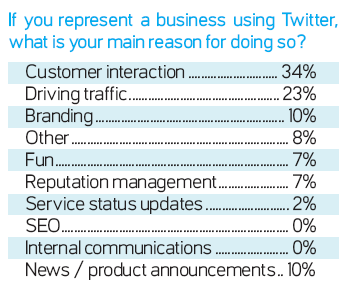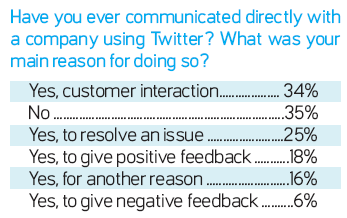Conversational Marketing With Twitter

By Kalena Jordan
Twitter has officially entered the mainstream. From Ashton Kutcher's CNN challenge to first glimpses of passengers being evacuated from the ditched airplane on the Hudson River, the world knows the word "Twitter."
But is Twitter just an emergency beacon and "a toy for bored celebrities and high-school girls," as The New York Times reporter Maureen Dowd claims?
Thankfully, no. The latest wave of Twitter users are business executives. They range from home business owners and marketing executives, to brand evangelists and CEOs. Take a look at ExecTweets.com and you'll see some well-known names with active Twitter accounts: Richard Branson of Virgin, Lisa Stone, co-founder of BlogHer, Tony Hsieh, CEO of Zappos, and Steve Case, co-founder of AOL, to name a few.
Twitter provides a way for businesses to promote products and services, resolve problems and customer complaints, and connect with current and potential consumers. And it all takes place in the form of a conversation - not a traditional marketing pitch.
Twitter as a Business Tool
As the saying goes, "content is king." But as the Web transitions from 2.0 to 3.0, immersive conversation is quickly challenging the throne. Twitter allows businesses to engage directly with consumers and potential customers in real time in front of an impressionable public. The opportunity this provides is unparalleled.
Twitter attracted serious interest from businesses and their executives because they know conversation is a powerful and persuasive business tool. And right now, Twitter is where the conversation is taking place.
"Twitter allows for a personal, real-life brand presence, while fostering better communication, engagement and attention to our customers," says Josh Austin, social media manager for Overstock when asked why he thinks Twitter is a good fit for businesses.
To find out how Twitter is being used as a business tool, I set up a Twitter poll:

Based on these results, the majority of companies that took this poll are using Twitter primarily to interact with their customers (34 percent) and drive traffic (23 percent). It's a clear indication that both businesses and consumers are finding value in Twitter. Another poll was issued to find out how consumers interact with businesses on Twitter.
 It's encouraging to see that 65 percent of poll respondents conversed with a company using Twitter. Considering that nearly half of those people had an issue to resolve (25 percent), the potential for customer loss and retention is enough for every business to open a Twitter account, and to monitor it closely. Then there's the number of respondents giving companies direct feedback (positive or negative) via tweets - a virtual PR goldmine.
It's encouraging to see that 65 percent of poll respondents conversed with a company using Twitter. Considering that nearly half of those people had an issue to resolve (25 percent), the potential for customer loss and retention is enough for every business to open a Twitter account, and to monitor it closely. Then there's the number of respondents giving companies direct feedback (positive or negative) via tweets - a virtual PR goldmine.
Meg Geddes, a search marketing expert and heavy Twitter user related her recent positive experience with a business. "At the end of December, there was a special one-dayonly promotion through Intuit and Staples for buying Quickbooks Pro, where you'd get a full rebate," Geddes says. "I ordered it and filled in my rebate paperwork but it was illegible and had to be re-faxed. The date on the revised paperwork sent by Intuit didn't match my order date (and I didn't notice) so my rebate was denied. I was complaining about it on Twitter and, within half an hour, someone from Intuit sent me a tweet asking if she could help. I explained the situation and she had the rebate approved. I was very happy, as I had been expecting to have to sit on the phone for hours with Intuit and/or Staples."
Conducting keyword research on Twitter for your business name can reveal opportunities that stem from problems or complaints, like the one above. But businesses can also find opportunities by scanning Twitter for industry wide terms, or competitor's businesses.
The Pizza Meal Win
It's not just big brands that can benefit from using Twitter. Small businesses have just as much to gain. Take Silicon Valley pizza chain, Tony & Alba. By using keyword tracking and the Twitter Search tool, they monitored conversations on Twitter involving the keyword "pizza."
Seeing a tweet from a local man to his friend suggesting a rival pizza place for dinner that night, Tony & Alba tweeted the man directly suggesting their pizza restaurant instead. It was further away for the man and his family, but a quick offer from Tony & Alba to reserve a table and free soft drinks clinched the deal. A positive meal experience and a single tweet won respect and future business from three happy families.
The Free Burrito Fail
Before using Twitter to promote your products, make sure you're prepared for the potential rush of business, and set qualifiers in the offer. In February 2009, Utah-based Mexican restaurant chain Costa Vida sent a one-day-only offer for a free burrito to its 80 Twitter followers. As part of the promotion, Costa Vida required customers to have an electronic coupon on their mobile phone.
The burrito was designed to test the effectiveness of leveraging social media websites like Twitter and Facebook in brand building and driving restaurant traffic. However, Costa Vida customers tweeted about the promotion and forwarded the offer to friends via mobile phone. Their followers told their own followers and so on, until more than 2,500 people inundated one of Costa Vida's stores looking for their free burrito.
Costa Vida sent multiple Twitter updates with instructions on how new Costa Vida fans could redeem their coupon on a future date for the (now sold-out) burritos.
Companies with shareholders monitoring their every move can't afford to have their brand sullied at the virtual water cooler. So, these companies employ staff to send out short bursts of 140 characters every hour or so, thereby controlling their presence on Twitter. They are already at the water cooler and they're handing out the cups. It's important to remember that Twitter opens the door for positive experiences, but can also empower users to quickly damage a company's reputation. Therefore, it's important to monitor the conversations for any problems, and to respond quickly and respectfully. Take advantage of tools like TweetBeep to set keyword alerts pertaining to your company, and TweetDeck to manage your Twitter account(s).
Could your business be a Twitter success story? Here's one last piece of advice, from blogging consultant Michael Martine: "If you're on Twitter to market your business, the best thing you can do is shut up about your business and help people."
About the Author: Kalena Jordan (@kalena) writes a daily Search Engine Advice Column, and is co-founder of Search Engine College - an online training in-stitution offering online instructor-led and self-study courses in Search Engine Optimization and other Search Engine Marketing subjects.

Subscribe to Our Newsletter!
Latest in Social Media









